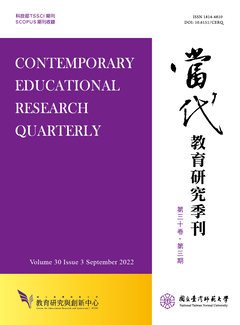

研究目的
主要照顧者(通常是母親)如能穩定且有效地回應兒童的需求, 將有益於兒童往後的身心適應與社會發展。雖然這在家庭生活教育 領域已是普遍的共識,但是對照顧者來說,要能夠持續採取積極回 應的教養行為並不是件容易的事情。本研究的主要目的,即是探討 母親回應教養與學齡前階段兒童安全依附表現的雙向影響歷程。一 方面,本研究援用依附理論的觀點,探討主要照顧者回應教養對兒 童安全依附表現的正向影響。另一方面,本研究探討主要照顧者回 應教養在兒童 36 至 60 月齡期間的穩定程度,並且驗證兒童安全依 附表現有助於主要照顧者持續採取回應教養行為。
研究設計/方法/取徑
本研究使用臺灣幼兒發展調查資料庫的 36 月齡組並且由兒童母親完成連續三波次(36 月齡、48 月齡,以及60 月齡)家長問卷的 追蹤調查資料,有效資料共計有 1,051 筆(520 筆為育有男童母親的 資料;531 筆為育有女童母親的資料),以結構方程模型(structural equation modeling)進行交互延宕模式(cross-lagged model)分析,探討母親回應教養行為的穩定程度,以及母親回應教養與兒童安全 依附表現之間的雙向影響。
研究發現或結論
分析結果顯示假設模型具有可接受的整體適配度,並且指出(1) 母親在兒童 36 月齡時的回應教養對兒童 48 月齡時的安全依附表現 具有顯著的正向效果,但是母親在兒童 48 月齡時回應教養對兒童 60 月齡時安全依附表現的效果卻未達顯著水準;(2)母親回應教養在 兒童 36 月齡與 48 月齡之間,以及 48 月齡與 60 月齡之間都具有中 等的穩定度,而且母親在兒童 48 月齡與 60 月齡時的回應教養,會 分別受到兒童 36 月齡與 48 月齡時安全依附表現的正向影響。
研究原創性/價值
本研究透過交互延宕模式分析,不僅較嚴謹地探討主要照顧者 回應教養與兒童安全依附表現之間的雙向因果關係、檢證依附理論 觀點適用於臺灣學齡前兒童與其母親之間的互動,同時也突顯出學 齡前兒童在主要照顧者的親職任務中是具有主體性、功能性,以及 相互性的重要角色。
教育政策建議或實務意涵
根據分析的結果,本研究鼓勵家庭生活教育實務工作者,或家 庭輔導諮商(詢)的助人工作者與兒童教育工作者,應當更加重視 建立安全依附的親子關係在早期生命階段的重要性,因為家長的教 養行為不僅具有相當的可塑性,而且還會受惠於兒童的安全依附表 現。而且,可以試著鼓勵家長以正向觀點看待兒童的人際互動表現,將有助於維持回應式的教養行為 。
Purpose
When the primary caregivers (usually the mother) can reliably respond to the preschool children, it benefits the children's physical and mental adaptation and social emotional development in future. Although this is a common consensus in the field of family life education, it is not easy for caregivers to keep responsive parenting. The main purpose of this study is to explore the bidirectional influences between mothers' responsive parenting and preschool children's secure attachment behavior. On the one hand, this study used the database from Taiwanese families to replicate the argument in the attachment theory that the mothers' reliable responsiveness has a positive effect on their preschool children's secure attachment behavior. On the other hand, this study explored the stability of mothers' responsive parenting during children’s 36 to 60 months old and further investigated the children’s secure attachment behavior also has a positive effect on mothers' responsiveness parenting.
Design/methodology/approach
This study used a longitudinal database collected from Kids in Taiwan Study, which were completed by mothers when their children were 36, 48, and 60 months old. The total valid sample size was 1,051, with 520 completed by boy̕s mothers and 531 by girl̕s mother. A cross-lagged model was conducted through structural equation modeling to investigate the stability of mothers̕ responsive parenting and the bidirectional influences between mothers̕ responsive parenting and children̕s secure attachment behavior.
Findings/results
The results of the hypothetical model with an acceptable fitness (SBχ2 = 303.571, df = 202, p < .001, SBχ2/df = 1.503, CFI = .979, TLI = .972, RMSEA = .022, 90%CI of RMSEA = [.017, .027] , SRMR = .028) indicated that the effect of mothers̕ responsive parenting (when their children aged 36 months) was positive and significant on children’s secure attachment behavior (when their children aged 48 months) (estimate = .168, p = .026, but the effect of mothers̕ responsive parenting (when their children aged 48 months) on children’s secure attachment behavior (when their children aged 60 months) was non-significant. Mothers̕ responsive parenting displayed moderate stability when their children aged from 36 to 48 months (estimate = .348, p < .001) and aged from 48 to 60 months (estimate = .441, p < .001). The effect of children’s secure attachment behavior (when they aged 36 months) was positive and significant on mothers̕ responsive parenting (when their children aged 48 months) (estimate = .275, p < .001), and the effect of children’s secure attachment behavior (when they aged 48 months) was positive and significant on mothers̕ responsive parenting (when their children aged 60 months) (estimate = .217, p < .001).
Originality/value
Through a cross-lagged model analysis, this study more rigorously explored a bidirectional association between the caregivers’ responsiveness and children’s secure attachment behavior. It also showed that the argument of attachment theory was applicable to the interaction between Taiwanese preschool children and their mothers. Furthermore, it highlighted that the preschool children play an agentive, functional, and mutual role in their mothers’ parenting task.
Implications for policy/practice
Based on the current results, this study encourages practitioners of family life education, or helpers of family counseling/consulting, could pay more attention to the importance of social emotional learning in the early life stage and understand the parental behaviors are not only plastic but contributed by children’s social emotional competency. And, parents are encouraged to view children’s interpersonal interaction performance in a more positive framework, which would benefit them keeping responsive parenting.

This work is licensed under a Creative Commons Attribution-NonCommercial 3.0 Taiwan License.
Center for Educational Research and Innovation, National Tawain Normal University
162, Ho-Ping East Rd, Sec. 1, Taipei, Taiwan | Tel:+886-2-7749-3670 | E-mail: cerecerq@gmail.com
CERI | NTNU | E-mail Alerts | Open Journal System
© 2014 CERI-NTNU
